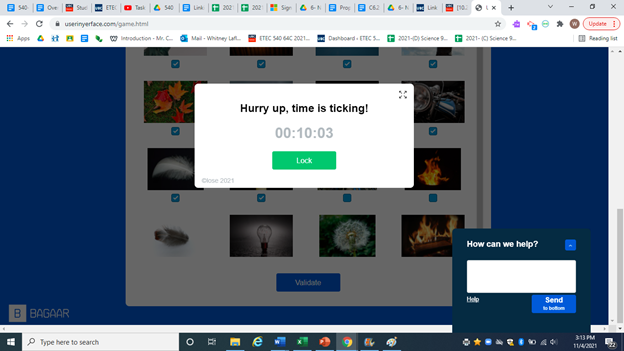 After reading about the GUI game and the task for this assignment I briefly opened the game to see how long it would take to play the game. I wanted to ensure I was scheduling in enough time to complete it. After spending about 60 seconds clicking around the first level of the game I realized what the game had intended to do. Annoy the living daylights out of me! So the next day I prepared for the game by making sure I was on a PC for easier maneuverability of the website and had a mindset of patience so I wouldn’t get frustrated. As I progressed through the game I was becoming increasingly confident in my abilities. I would try and predict where the game was trying to pull my attention and look for less obvious solutions to progress. I struggled a bit but persevered through the levels. Upon reaching the final stage I attempted to figure out how to pass the level and after several failed attempts I threw in the towel. Had I had more time I probably would have continued to try and figure it out but life priorities took over and I had to stop.
After reading about the GUI game and the task for this assignment I briefly opened the game to see how long it would take to play the game. I wanted to ensure I was scheduling in enough time to complete it. After spending about 60 seconds clicking around the first level of the game I realized what the game had intended to do. Annoy the living daylights out of me! So the next day I prepared for the game by making sure I was on a PC for easier maneuverability of the website and had a mindset of patience so I wouldn’t get frustrated. As I progressed through the game I was becoming increasingly confident in my abilities. I would try and predict where the game was trying to pull my attention and look for less obvious solutions to progress. I struggled a bit but persevered through the levels. Upon reaching the final stage I attempted to figure out how to pass the level and after several failed attempts I threw in the towel. Had I had more time I probably would have continued to try and figure it out but life priorities took over and I had to stop.
It was obvious to me that throughout the GUI game I was trying to notice and pick up on the manipulations of my attention. Big bolded words, common webpage phrases like “next” or “help” were not so helpful. I tried to stay away from clicking those. My previous experience in using the web interfaces, and thinking I knew what to expect to click to progress, was actually a hindrance. You always had to click somewhere where you wouldn’t expect. Once I got the hang of the manipulations, I came to expect them and playing the game got a little easier. However, one unintended manipulation I had not thought of until reflection afterwards was the game’s ability to hold my attention and make me want to keep playing. I was so focused on thinking through the manipulations of the actual game I hadn’t thought about the game’s ability to grasp my attention and hold it. The game created small problems that were solvable through trial and error. This allowed me to progress to the next level and feel success. Everyone loves that feeling and games have the unique ability to do that. I had not thought about the positive reinforcement of the game as a manipulation until I watched the TED talk by Tristan Harris (Harris, 2017), a former ethicist at Google. Harris discusses the thoughtful manipulation that many internet companies try to design to grasp and hold your attention. He explains that these companies are not afraid to try and evoke emotions like “outrage”, as it works really well at getting attention. The only issue is that these companies are then not accountable to the people they are making feel that way. They are only worried about how much time they can hold your attention. The companies do not worry about how it might make someone feel or how it is impacting these people’s lives. Social media, webpages, games all have an ability to grasp your attention and manipulate you in an attempt to continue to hold your attention. To think that there are rooms full of people out there working at ways to distract me from parts of my daily life, distract me from perhaps things that are very important to me, is a scary thought. The internet and technology in general is a very powerful tool that can manipulate text in very unique and strong ways. I hope that society understands this power and is mindful of how easily manipulated we can be.
References
Harris, T. (2017, April). How a handful of tech companies control billions of minds everyday [Video]. TED Conferences. https://www.ted.com/talks/amy_cuddy_your_body_language_shapes_who_you_are
